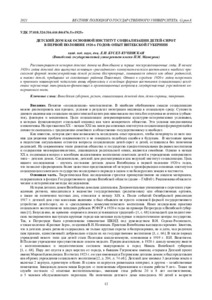Please use this identifier to cite or link to this item:
https://elib.psu.by/handle/123456789/28351Full metadata record
| DC Field | Value | Language |
|---|---|---|
| dc.contributor.author | Бусел-Кучинская, Е. Н. | - |
| dc.contributor.author | Busel-Kuchinskaya, E. | - |
| dc.date.accessioned | 2021-12-15T11:54:04Z | - |
| dc.date.available | 2021-12-15T11:54:04Z | - |
| dc.date.issued | 2021 | - |
| dc.identifier.citation | Бусел-Кучинская, Е. Н. Детский дом как основной институт социализации детей-сирот в первой половине 1920-х годов: опыт Витебской губернии / Е. Н. Бусел-Кучинская // Вестник Полоцкого государственного университета. Серия E, Педагогические науки. - 2021. - № 15. - С. 12-15. | ru_RU |
| dc.identifier.issn | 2070-1640 | - |
| dc.identifier.uri | https://elib.psu.by/handle/123456789/28351 | - |
| dc.description.abstract | Рассматривается история детских домов на Витебщине в первые послереволюционные годы. В начале 1920-х годов детский дом выступал основным «рассадником» коммунистического воспитания и наиболее приемлемой формой жизнеустройства детей региона (беспризорных, лишившихся одного или обоих родителей, а также детей, прибывших из голодающих районов Поволжья). Однако к середине 1920-х годов теоретики и практики новаторской педагогики вновь обратились к семейным формам воспитания (социализации) вследствие нерешенных материально-финансовых и организационных вопросов в государственных учреждениях интернатного типа.= The article is devoted to the history of orphanages in the Vitebsk region in the first post-revolutionary years. In the early 1920s, the orphanage was the main "hotbed" of communist education and the most acceptable form of life for the children of the region (homeless children who lost one or both parents, as well as children who arrived from the starving regions of the Volga region). However, by the mid-1920s, theorists and practitioners of innovative pedagogy again turned to family forms of upbringing (socialization) due to unresolved material, financial and organizational issues in state boarding-type institutions. | ru_RU |
| dc.language.iso | ru | ru_RU |
| dc.publisher | Полоцкий государственный университет | ru_RU |
| dc.relation.ispartof | Веснік Полацкага дзяржаўнага ўніверсітэта. Серыя E, Педагагічныя навукі | be_BE |
| dc.relation.ispartof | Herald of Polotsk State University. Series E, Pedagogical Sciences | en_EN |
| dc.relation.ispartof | Вестник Полоцкого государственного университета. Серия E, Педагогические науки | ru_RU |
| dc.relation.ispartofseries | Серия E, Педагогические науки;2021. - № 15 | - |
| dc.rights | open access | ru_RU |
| dc.subject | Государственный рубрикатор НТИ - ВИНИТИ::ОБЩЕСТВЕННЫЕ НАУКИ::Народное образование. Педагогика | ru_RU |
| dc.subject | Витебская губерния | ru_RU |
| dc.subject | Регион | ru_RU |
| dc.subject | Социализация | ru_RU |
| dc.subject | Детский дом | ru_RU |
| dc.subject | Дети-сироты | ru_RU |
| dc.subject | Патронат | ru_RU |
| dc.subject | Vitebsk province | ru_RU |
| dc.subject | Region | ru_RU |
| dc.subject | Socialization | ru_RU |
| dc.subject | Orphanage | ru_RU |
| dc.subject | Orphans | ru_RU |
| dc.subject | Patronage | ru_RU |
| dc.title | Детский дом как основной институт социализации детей-сирот в первой половине 1920-х годов: опыт Витебской губернии | ru_RU |
| dc.title.alternative | Children's House as the Basic Institute of Socialization of Orphan Children in the First Half of the 1920s: the Experience of the Vitebsk Province | ru_RU |
| dc.type | Article | ru_RU |
| dc.identifier.udc | 37.018.324:316.614:84(476.5)«1925» | - |
| Appears in Collections: | 2021, № 15 | |
Items in DSpace are protected by copyright, with all rights reserved, unless otherwise indicated.
